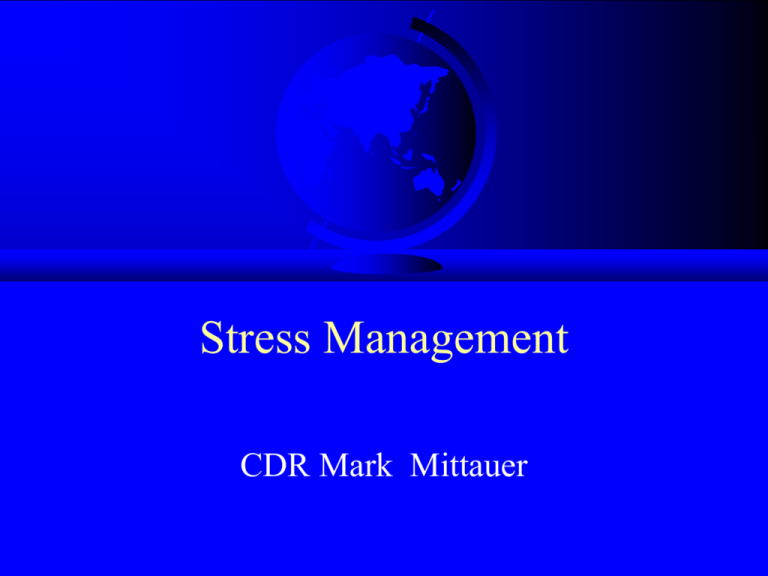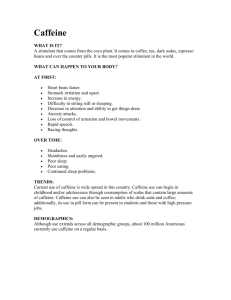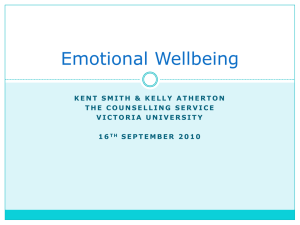Stress-Management
advertisement

Stress Management CDR Mark Mittauer Enabling Objectives Identify causes of stress Discuss the harmful effects of stress Discuss how to eliminate avoidable sources of stress Discuss how to adjust to unavoidable sources of stress Enabling Objectives (cont.) Discuss techniques for improving assertiveness Discuss techniques for better anger management Describe and practice three stress management exercises Causes of Stress What are sources of stress in your life? Stress may result from daily hassles Stress may result from major life events Stress may result from welcome life events (e.g., promotion, marriage) CHANGE is a major source of stress Harmful Effects of Stress Illness - infections, cancer progression, high blood pressure, obesity from overeating, heart disease, ulcers Fatigue - that may lead to mistakes and injury or death Useful Stress Stress can be helpful when it motivates us to accomplish a task now! Symptoms of Stress Physical Emotional Cognitive Behavioral Physical Symptoms of Stress muscle tension headache fatigue sleep problems gastrointestinal problems high blood pressure Emotional Symptoms of Stress irritability arguing anxiety depression lack of enjoyment mood swings suicidal thoughts homicidal thoughts Cognitive Symptoms of Stress inattention distractibility forgetfulness confusion poor concentration Behavioral Symptoms of Stress social isolation work problems conflicts with coworkers, friends, and loved ones unhealthy habits - overeating, alcohol misuse, nicotine use, caffeine misuse, workaholism aviator: conflicts with peers, disregarding rules and checklists Better Stress Coping Eliminate avoidable causes of stress Handle unavoidable causes of stress more effectively Avoidable Causes of Stress Nicotine Alcohol Overeating Caffeine Sleep problems Nicotine Chewing tobacco (“dip”) can cause mouth or lip cancer Exhaled “secondhand” smoke can cause lung cancer, heart disease, and respiratory infections in nonsmoking bystanders Smokers miss twice as much work as nonsmokers due to illness Nicotine (cont.) The medical effects of nicotine use should be well known Children exposed to smoke develop colds, ear infections, asthma, bronchitis, and pneumonia To stop smoking - talk to a medical department representative about smoking cessation classes and nicotine replacement products Alcohol Medical problems from alcoholism depression, liver disease, ulcers, high blood pressure Almost one half of sailors who suicide are drunk A blood alcohol level of .15 increases your chance of a car wreck 24 times NATOPS 3710.7Q: no alcohol within 12 hours of flight planning; no hangover! Alcohol (cont.) Drinking only two drinks at bedtime causes less restful sleep - leading to fatigue the next day If you drink too much - talk to your command DAPA or medical department representative, or visit Alcoholics Anonymous (AA) Overeating Medical problems from overeating - obesity, high blood pressure, diabetes, heart disease, stroke, high lipid levels Strict dieting or fasting does not result in sustained weight loss - your metabolism slows and you regain weight when you resume “normal” eating Overeaters’ Anonymous may help Overeating (cont.) Commercial weight reduction programs and diets are costly and no more effective Eat three meals a day - to avoid evening binges Select a high fiber, low fat diet Cut calories by using sugar substitutes, sugar-free sodas, fat-free salad dressing, and skim milk; avoid gravy, deserts Healthy snacks - carrots, celery, pickles, lettuce, fruit Caffeine Caffeine increases your alertness for several hours - but then causes increased fatigue Health problems from caffeine use - high blood pressure, anxiety, irritability, withdrawal headaches, sleep problems Insomnia may result from any caffeine use after noon Mountain Dew, chocolate, and tea have caffeine Caffeine (cont.) Decrease your caffeine intake to two or less cups of coffee (or the equivalent) per day Decrease your caffeine use by eliminating one cup of coffee from your daily intake every few days Sleep Problems 80% of Americans do not get enough sleep Poor sleep causes fatigue, irritability, depression, work inefficiency, and accidents Optimal sleep - 8 to 8.5 hours per night (need minimum of 5 hours to avoid performance difficulties - especially for sedentary persons making complex decisions or needing to be attentive) More Sleep Facts: Causes of fatigue: 1) sleep debt 2) circadian rhythm disruption 3) prolonged effort (mental, physical) Myths about sleep: 1) cannot “bank” sleep 2) wakeful rest does not replace sleep Even More Sleep Facts: Symptoms of sleep deprivation: 1) hallucinations (REM intrudes into day) 2) excessive yawning 3) impaired concentration and memory 4) head bobbing (due to “microsleep”) Remedy for sleep deprivation: 1) caffeine 2) naps for 60 minutes max (if longer, allow 20 minutes to reach alert state) How to Improve Sleep avoid heavy exercise and alcohol before bed avoid caffeine use after noon go to bed and awaken at the same time if unable to fall in 30 minutes, arise and read until you feel sleepy avoid naps longer than 30 - 60 minutes relax for 30 to 60 minutes before bedtime relaxation techniques may induce sleep do not check your alarm clock during night How to Approach Unavoidable Stress Try specific stress management techniques discussed later Change your outlook on how you view stress Specific Stress Management Techniques Talk to someone (friend, chaplain, mentor, Family Service Center counselor, flight surgeon) Create a support network of friends Schedule fun activities - noncompetitive hobby, reading, music, sightseeing Schedule down time when you have no other activities planned Introduce spirituality into your life Specific Techniques (cont.) Volunteer to help someone - your life will feel meaningful Aerobic Exercise (biking, running, walking, swimming, aerobics) at least 30 minutes three times a week - improves mood and mental alertness and relieves tension Unclutter your brain - keep an appointment book; write down tasks and prioritize them Allow extra time (arise 10 minutes earlier) Improve Time Management review your calendar and list of tasks daily prioritize your tasks tackle difficult or irksome tasks first have an agenda for meetings - develop time limits for each agenda item avoid taking office work home work efficiently - you do not have to complete all tasks perfectly make a “plan of attack” and set milestones Reduce Job Stress Remember that your job is important (hull technician example) Be cheerful - the world will not end if you are grim and serious all the time! Praise your coworkers often - with formal and informal awards Take “fun breaks” at work - talk to someone or review pictures of momentos of fun times Reduce Job Stress (cont.) Divide the work day into “time chunks” Plan a fun activity after work Delegate work to others If you fall behind, request help and inform your supervisor Set limits on what you are asked to do Establish realistic goals If you feel overwhelmed, do something! Change Your Outlook on Stress When you feel stressed - take a break, breathe slowly, walk around View life as a challenge or opportunity to excel - and not as a crisis When something goes wrong - think of three ways the situation could be worse Live life “one day at a time” - do not dwell on past mistakes, worry about the future, or wait (miserably) for future happiness Change Your Outlook (cont.) Learn to enjoy the simple pleasures of life Do not wait for others to make you happy (maintain an internal locus of control) You cannot control how you feel - but you can control what you do with those feelings and how long you keep them (example: when you are angry, do something fun after 30 minutes) Find the positive part of every situation Change Your Outlook (cont.) Stop wasting time worrying - develop a plan to approach the problem and do something Be prepared to wait - carry book to read, a portable cassette player, or hobby materials Be wary of “the grass is always greener” syndrome before you leave your current situation Always have a back-up plan Decide now what is really important Faulty Thinking Causes Stress Catastrophizing - anticipating a terrible outcome; overexagerating the importance of a situation “I can’t stand it” - deciding that you cannot handle a situation, without trying - alternative: “I can handle this!” “Should” statements e.g. “I should always be happy” - alternative: “I’m human. I am allowed to make a mistake or have a bad day.” Faulty Thinking (cont.) “Beating yourself up” about past mistakes that you cannot change Worrying about situations over which you have no control, or cannot change e.g., “If only I had 20/20 vision” Overgeneralizing - viewing one negative event as predicting a never-ending pattern of defeat e.g., “My girlfriend dumped me. I will Faulty Thinking (cont.) reasoning - thinking, “I feel it, so it must be true.” e.g., “I am anxious today, so something terrible will happen!” Personalizing - blaming yourself for something that is not your fault Fairness fallacy - becoming angry when something disappoints you because you think, “life is supposed to be fair!” Emotional How to Correct Faulty Thinking Recognize your faulty thought patterns Replace irrational ideas with more accurate and realistic ideas Anger Management You can choose to control how you express your anger (others won’t respect you if you curse, yell, or use violence - and you are too important to let situations control you) Speak calmly when disagreeing If you are about to lose control - count to “10” slowly, breathe deeply, and walk away if necessary Anger Management (cont.) Set limits on how long you choose to be angry - then do something nice for yourself When you disagree with someone, stick to the present issue (and avoid dredging up past hurts) Criticize someone’s behavior, not their character Assertiveness/Better Communication Ask for what you desire Refuse a “tasker” if you do not really want to do it, or if you lack the time to do it well When you make a request, give a reason Be specific with your request (tell the receiver exactly what you want done) Be a good listener - give your full attention, show interest, and summarize what you heard Relaxation Techniques Slow deep breathing Progressive muscle relaxation Guided imagery Slow Deep Breathing Inhale slowly through your mouth or nose for 5 seconds, while allowing your stomach to push out Without pausing, exhale slowly for 5 seconds, and tell yourself to relax Perform this techniques for at least 5 minutes whenever you feel stressed, angry, anxious, overwhelmed, or unable to sleep Progressive Muscle Relaxation Sit in a comfortable chair or lie down Practice slow deep breathing for several minutes Then, tighten and relax each major muscle group in turn (you may choose to relax each muscle group twice) Guided Imagery Practice slow deep breathing for several minutes Then, practice progressive muscle relaxation Finally, imagine yourself in a pleasant, relaxing setting (example, the beach) Use all of your senses to observe your surroundings Any Questions? Finis





